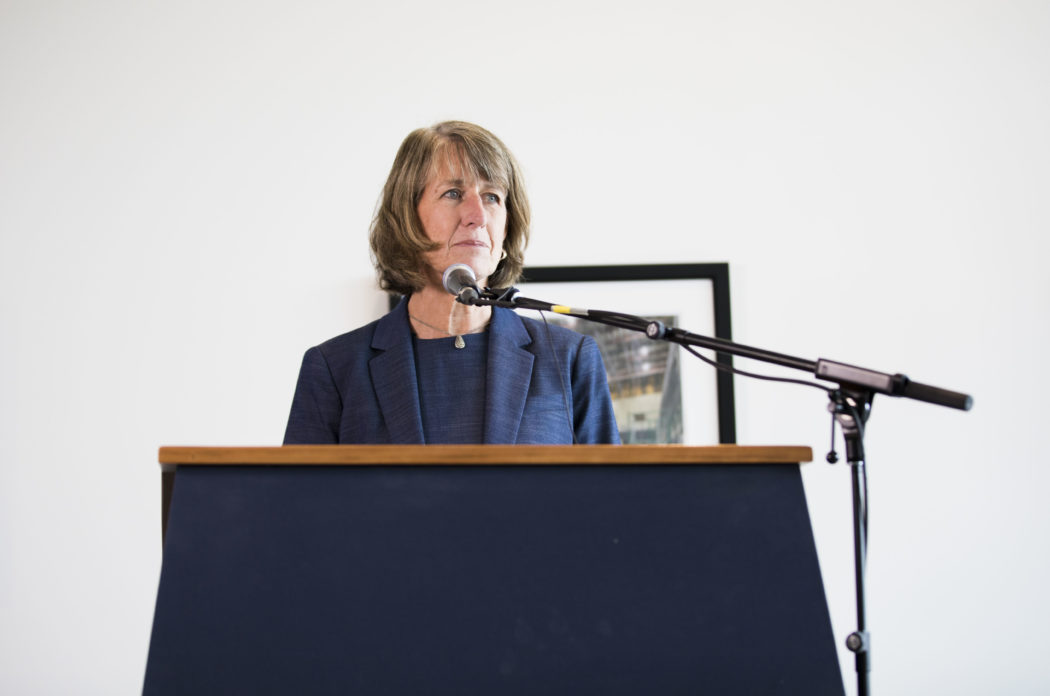USU may not return to normal for 12 to 18 months, President Cockett says
Utah State University President Noelle Cockett and other administrators held a virtual town hall Friday morning to announce the university may not be back to normal for 12-18 months. There will also be no postponement for the tuition and student fee increases approved in March.
“I want to stress, this is not as simple as flipping a switch,” Cockett said. “Unfortunately, the ‘way things used to be’ will not come until we have a vaccine for Covid-19.”
Because it could take a year to 18 months for a vaccine to develop, Cockett said USU must adjust to a “new norm.”
What does a new normal look like?
According to Cockett, this means people will come back on campus, but not “in the large free moving ways we used to have.” Events will occur, but the numbers of people allowed at events will be limited. Classes may also be face-to-face again, but classroom sizes will be much smaller.
Cockett also said to think of the situation like a dial with different colors. Right now, the school is in the “red phase” with severe restrictions. During the summer and possibly into fall, the university hopes to move to “orange” with some relaxed measures. Then the “yellow phase” will be larger class sizes and bigger events before finally hitting the “green phase,” which will signal everything is back to normal.
In terms of tuition and student fees, Cockett said there is no feasible way to postpone any tuition increases. Back in March, USU held a town hall to announce a 2.8 increase in tuition and $4.46 increase in student fees per each student for the 2020-2021 school year.
“I wish we could, but it’s not possible,” she said. “Those increases are essential for keeping our people paid.”
The Utah legislature determines salary increases for public employees and has already determined all public employees will receive a 2.5 percent salary increase. In addition, the state only provides 75 percent of the funding towards those salary increases. As a result, Cockett said, “we need tuition increases to keep university staff employed and keep essential functions going.”
The administration also wanted to dispel rumors that university expenses would decrease when everything moved online. According to USU’s vice president for Business and Finance David Cowley, USU has lost quite a bit of revenue due to cancelled events and having to refund student housing and meal plans. Extra labor hours spent to transition online have also been costly for the university.
Fortunately for university employees, Cowley said labor expenses have not been reduced, even without revenue coming in.
“One of my simple goals was to keep our employees, to keep them paid and not have to move them into furloughs or reduction in force,” Cockett said. “But there was never any danger of that because everyone kept working.”
Cockett also wanted faculty members to know if they have been notified about receiving a promotion, they are still receiving that promotion.
Cowley said money from the federal stimulus package will help USU in coming months, as well as potential assistance from the Federal Emergency Management Agency or FEMA.
James Morales, USU’s vice president for Student affairs, also explained why students would still receive a student fee increase.
“We looked closely at how best to manage these fees and we determined the majority of students are still able to access the array of services they are paying for with their fees,” Morales said.
For example, Morales said students should still be able to access health and counseling services because those services have been moved virtually to a “telehealth service.” Other things like the Aggie shuttle have to keep their funding because they are a fixed fee.
One plan to help students navigate the financial challenges presented by Covid-19 will be through the Cares Act passed by Congress in March, Cockett said. The Cares Act, or Coronavirus Aid, Relief and Economic Security Act will provide financial assistance to universities that will go directly to students. According to Cockett, the application will be similar to the annual financial aid application, but will cover more expenses than just tuition and fees. She added the application will be available to students before summer sessions start.
Summer classes will also be happening, however, they will be online. To make the process easier, Cockett said online course fees will be eliminated. In addition, out-of-state students will not be required to pay non-resident tuition for the summer.
For incoming freshmen who have been unable to take the SAT or ACT because of coronavirus shutdown, Vice President Robert Wagner said the admissions office will be looking at GPA and will handle students on a case-by-case basis.
“I’m confident we will be able to adapt,” he said.
Cockett ended the meeting by expressing thanks and saying she was proud of the university community.
“I’m sad that our spring semester could not finish like other spring semesters, I’m disappointed we couldn’t share some of the celebrations and events we had planned. I’m nervous about the future and I’m scared,” Cockett said. “I’m scared for my family; I’m scared for my neighbors and I’m scared for my community. But then I know I am incredibly proud of our university community. I am proud of our students, I am proud of our staff, I am proud of our friends and we are going to make it.”
taylorcripe@gmail.com
@cripe_taylor

